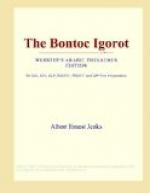Tribute may be paid more or less regularly by one group of people to a stronger, or to one in a position to harass and annoy — for the protection of the stronger, or in acknowledgment of submission, or to avoid harassment or annoyance. Nothing of the sort exists in Bontoc. The nearest approach to it is the exchange of property, as carabaos or hogs, between two pueblos at the time a peace is made between them — at which time the one sueing for peace makes by far the larger payment, the other payment being mere form. This transaction, as it occurs in Bontoc, is a recognition of submission and of inferiority, and is, as well, a guarantee of a certain amount of protection. However, such payments are not made at all regularly and do not stand as true tributes, though in time they might grow to be such.
Nothing in the nature of a tax for the purpose of supporting a government exists in Bontoc. The nearest approach to it is in a practice which grew up in Spanish time but is of Igorot origin. When to-day cargadors are required by Americans, as when Government supplies must be brought in, the members of each cargador’s ato furnish him food for the journey, though the cargador personally receives and keeps the wage for the trip. The furnishing of food seems to spring from the feeling that the man who goes on the journey is the public servant of those who remain — he is doing an unpleasant duty for his ato fellows. If this were carried one step further, if the rice were raised and paid for carrying on some regular function of the Igorot pueblo, it would be a true tax. It may be true, and probably is, in pure Igorot society that if men were sent by an ato on some mission for that ato they would receive support while gone. This would readily develop into a true tax if those public duties were to be performed continually, or even frequently with regularity.
“Rake off,” or, as it is known in the Orient, “squeeze,” is so common that every one — Malay, Chino, Japanese, European, and American — expects his money to be “squeezed” if it passes through another’s hands or another is instrumental in making a bargain for him. In much of the Igorot territory surrounding the Bontoc area “rake off” occurs — it follows the advent of the “headman.” It is one of the direct causes why, in Igorot society, the headman is almost always a rich man. During the hunting stage of human development no “rich man” can come up, as is illustrated by the primitive hunter folk of North America. As soon, however, as there are productions which may be traded in, there is a chance for one man to take advantage of his fellows and accumulate a part of their productions — this opportunity occurs among primitive agricultural people. The Bontoc area, however, has no “headman,” no “rich man,” and, consequently, no “rake off.”
PART 5
Political Life and Control
It is impossible to put one’s hand on any one man or any one group of men in Bontoc pueblo of whom it may be said, “Here is the control element of the pueblo.”




